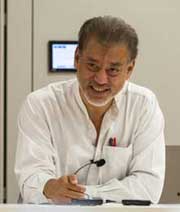
KUALA LUMPUR, Malaysia, Aug 28 (IPS) – Oxfam Expect the world’s first trillionaire within a decade and poverty to end in 229 years! The wealth of the world’s five richest men has more than doubled since 2020, as 4.8 billion people became poorer.

“This inequality is not a coincidence; the billionaire class ensures that corporations provide them with more wealth, at the expense of everyone else,” noticed Amitabh Behar of Oxfam International.
Fueling inequality
To summarize the report: Tanupriya Singh The gap between rich and poor and between rich and developing countries has widened for the first time in the 21st century, as the super-rich have become much richer.
The Global North holds 69% of all global wealth and 74% of billionaire wealth. Oxfam notes that modern concentration of wealth began with colonialism and empire.
Since then, “neo-colonial relations with the South have continued, perpetuating economic imbalances and manipulating economic rules in favor of rich countries.”
The report states that ‘economies in the Global South are forced to export primary commodities, from copper to coffee, for use by monopolistic industries in the Global North, perpetuating a colonial ‘extractivist’ model’.

Seventy percent of the world’s largest companies have a billionaire as their main shareholder or CEO. These companies are worth more than $10 trillion, which exceeds the total output of Latin America and Africa.
The incomes of the rich have grown much faster than those of most others. That’s why the top 1% of shareholders own 43% of the world’s financial assets – half in Asia, 48% in the Middle East and 47% in Europe.
Between mid-2022 and mid-2023, 148 of the world’s largest companies made $1.8 trillion in profits. Meanwhile, 82% of profits from 96 large companies went to shareholders through share buybacks and dividends.
Only 0.4% of the world’s largest companies have agreed to pay minimum wages to those who contribute to their profits. Unsurprisingly, the poorer half of the world earned just 8.5% of global income in 2022.
Nearly 800 million workers’ wages have not kept pace with inflation, losing $1.5 trillion in 2022 and 2023, an average of 25 days of lost wages per worker.
In addition to income inequality, there is also Oxfam Report 2024 Well-known employees are facing increasing challenges due to stressful working conditions.
The income gap between the super-rich and the working class is so great that it would take a female health or social worker 1,200 years to earn what a CEO of a Fortune 100 company earns annually!
In addition to lower wages for women, unpaid care work subsidizes the global economy with at least $10.8 trillion annually, three times what Oxfam calls the “tech industry.”
Monopoly power
Oxfam notes that monopoly power has exacerbated inequality in the world, with a few corporations influencing and controlling national economies, governments, laws and policies in their own interests.
Research by the International Monetary Fund (IMF) shows that monopoly power is responsible for 76% of the decline in labor’s share of US manufacturing income.
Behar noted: “Monopolies harm innovation and crush workers and smaller businesses. The world has not forgotten how pharmaceutical monopolies deprived millions of people of COVID-19 vaccines, creating a racist vaccine apartheid and creating a new club of billionaires.”
Between 1995 and 2015, 60 pharmaceutical companies merged to form ten Big Pharma giants. Although innovation is usually subsidized with government money, pharmaceutical monopolies rampantly increase prices with impunity.
Oxfam notes that Ambani’s fortune in India comes from monopolies in many sectors made possible by the Modi regime. The recent extravagant wedding celebrations of Ambani’s son have flaunted the extreme concentration of wealth worldwide.
The Oxfam Report 2021 estimated that “it would take an unskilled worker 10,000 years to earn what Ambani earned in an hour during the pandemic and three years to earn what he earned in a second.”
It is not surprising that the Oxfam Report 2023 noted: “India’s richest 1% own about 40% of the country’s wealth, while more than 200 million people still live in poverty.”
Fiscal subordination
Corporations have increased their value through a “sustained and highly effective war on taxes… depriving the public of critical resources.”
As many companies saw their profits rise, the average corporate tax rate fell from 23% to 17% between 1975 and 2019. Meanwhile, about $1 trillion disappeared into tax havens in 2022 alone.
Of course, falling corporate tax rates are also due to “the broader neoliberal agenda promoted by corporations and their wealthy owners, often in collaboration with countries in the Global North and international institutions such as the World Bank.”
Meanwhile, pressure for fiscal austerity has been mounting as government tax revenues have been falling relatively for decades. High government debts, coupled with corporate tax avoidance and evasion, have exacerbated austerity policies.
Underfunded public services have had a negative impact on consumers and workers, particularly health care and social protection. Higher interest rates have exacerbated debt crises in developing countries.
As governments become financially constrained in maintaining public services, proponents of privatization have become more influential and have gained control over public funds in various ways.
Private companies benefit from rebates on the sale of government assets, public-private partnerships, and government contracts to implement government policies and programs.
“Major development agencies and institutions… have found common ground with investors by embracing approaches that make such arrangements ‘de-risked’ by shifting financial risk from the private to the public sector,” the report said.
Access to essential public services should be universal. Insisting on private profit-making deprives marginalized communities of access, increasing inequalities.
IPS UN Office
Follow @IPSNewsUNBureau
Follow IPS News UN Bureau on Instagram
© Inter Press Service (2024) — All rights reservedOriginal source: Inter Press Service







